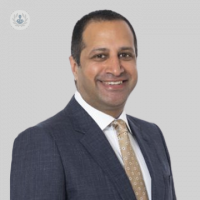How are heart palpitations treated?
Written by:In this article below, Dr Amit Bhan, a highly respected consultant cardiologist, outlines the main symptoms of heart palpitations, and reveals whether or not heart palpitations are common after eating.

What are heart palpitations? Are there different types?
There are indeed many different types of palpitations, and they represent different types of abnormal heartbeats. They can range from a very transient, little flutter in the chest, which might be related to a skipped heartbeat, to more sustained palpitations, where you feel the heart racing for long periods of time.
Then, in severe heart rhythm problems, palpitations can lead to other symptoms, such as breathlessness, chest discomfort, and even collapsing. These are obviously symptoms to be concerned about, as this could indicate a significant underlying heart rhythm abnormality.
What are the symptoms of heart palpitations?
The most common cause is what we call skipped beats. This can be felt when you get an early heartbeat within the cardiac cycle. Caffeine, lack of sleep, smoking, and stress cause this typically. If these symptoms persist, then you should get them checked out.
Are palpitations at night, and after eating, common? Can certain things trigger them?
Yes. We know that there is a relationship between the gastrointestinal tract and the heart rhythm. Some people are particularly sensitive, so after heavy meals, or after eating certain foods, people might notice palpitations.
The heart is quite sensitive to alcohol intake, so consuming alcohol frequently can exacerbate symptoms of palpitations.
How are heart palpitations treated?
Treatment will ultimately depend on the underlying cause. Lifestyle measures and modifications are suggested. There are a large number of medications available to reduce the risk and symptoms of arrythmia, but people would need an assessment of the heart to make sure there is no structural abnormality to the heart that might be causing the palpitations before being prescribed any medication.
To schedule an appointment with Dr Amit Bhan, head on over to his Top Doctors profile today.


